February 28 marked the one-year anniversary of the PSC-CUNY contract expiration. The next day, PSC members on nearly every campus held protests demanding that CUNY agree to a contract settlement that lifts salaries and invests in the future of the University.
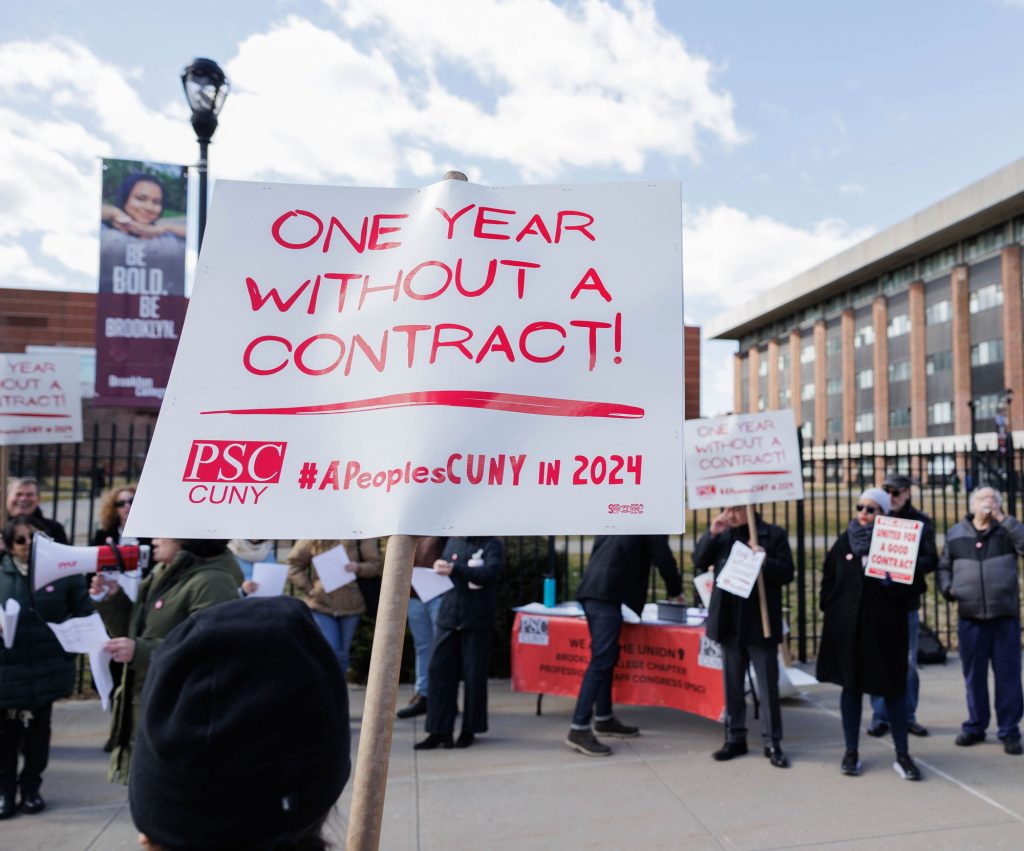
Members participate at an informational picket at Brooklyn College. Photo credit: Paul Frangipane
A year ago, PSC members marched outside CUNY Central’s office, demanding the administration come to the bargaining table. It took CUNY administrators months to agree to begin bargaining. And that delay has rankled members, who are dealing with rising costs of living and low morale on campus. Around the city, members united in outrage against CUNY’s intransigence. The demand is clear: CUNY must work with the PSC now to settle this contract soon.
CAMPUS PROTESTS
During a spirited informational picket outside the School of Labor and Urban Studies (SLU), Maureen LaMar, the manager of institutional and academic partnerships at SLU, said the fact that the contract has been expired for more than a year has begun to weigh heavily on members. And she believes CUNY’s bargaining strategy “feels more dire and aggressive” than in previous negotiations.
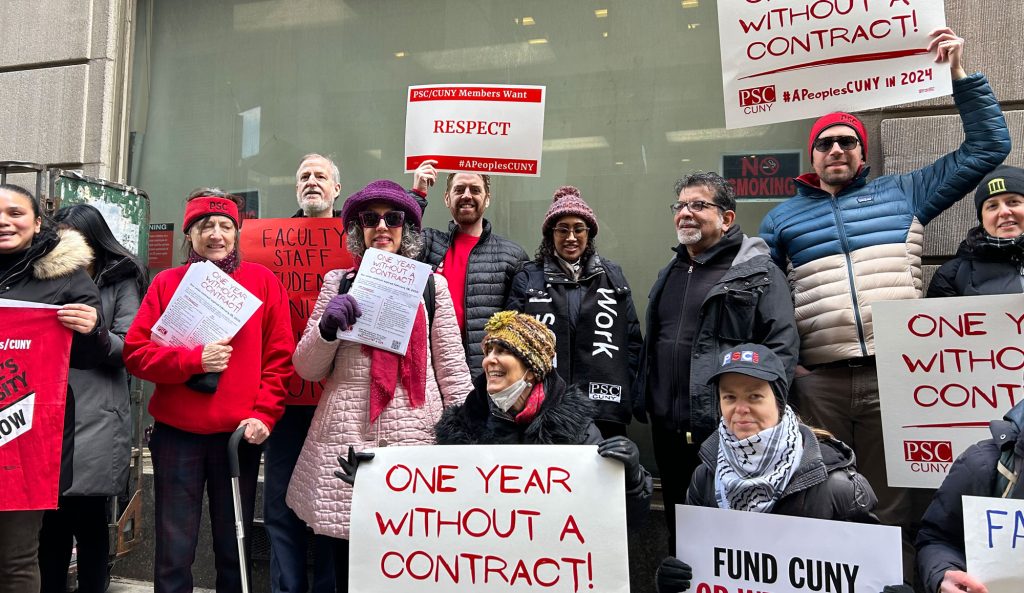
School of Labor and Urban Studies members at the march. Photo credit: Ari Paul
Joining her on the picket line was Linda Paradiso, an associate professor of nursing at the School of Professional Studies. Paradiso received her BA from the College of Staten Island and her master’s degree from Hunter College. She believes that CUNY’s bargaining demands are a deviation from CUNY’s public mission, from when she was a student and when she began her career as a CUNY educator. The concessions CUNY seeks, along with the delay in settling a contract, Paradiso said, have decreased morale and made it harder to retain instructional talent.
“The students ultimately suffer,” she said.
DRASTIC CUTS
Adi Gutiqi, a freshman at John Jay College, agreed. Joining the lunchtime protest, she said, “Students and faculty are united” because “if CUNY doesn’t meet the needs of the faculty and staff they can’t meet students’ needs.”
Ella Merriwether, a graduate assistant in psychology, staffed a PSC table in the lobby of the Graduate Center, where she spoke to dozens of members about the contract, saying that management was demanding “draconian-level cuts” while the union is fighting to “ensure a living wage for everyone.”
RISING COSTS
The delay in a contract settlement is taking a material toll on faculty and staff. Angie Sadhu, an executive assistant in the office of finance and administration at Guttman Community College, said during the SLU picket that a delay in raises, combined with the general rise in the cost of living, is hurting members. She noted that even though members still have step increases, many are at the end of their salary schedule and are thus going without any kind of economic adjustment. “We’re starting to feel it,” she said. “Inflation is a real thing.”
Janice Bockmeyer, an associate professor of political science at John Jay College, said that with the rising price of groceries and housing, faculty and staff need a new contract soon in order to live in New York City. “People are paying more with less,” Bockmeyer said.
Members held actions all over the city on February 29. Chapters protested outside the president’s office at York College and held tabling events at the Graduate Center and Medgar Evers College, while marches took place at many other campuses.
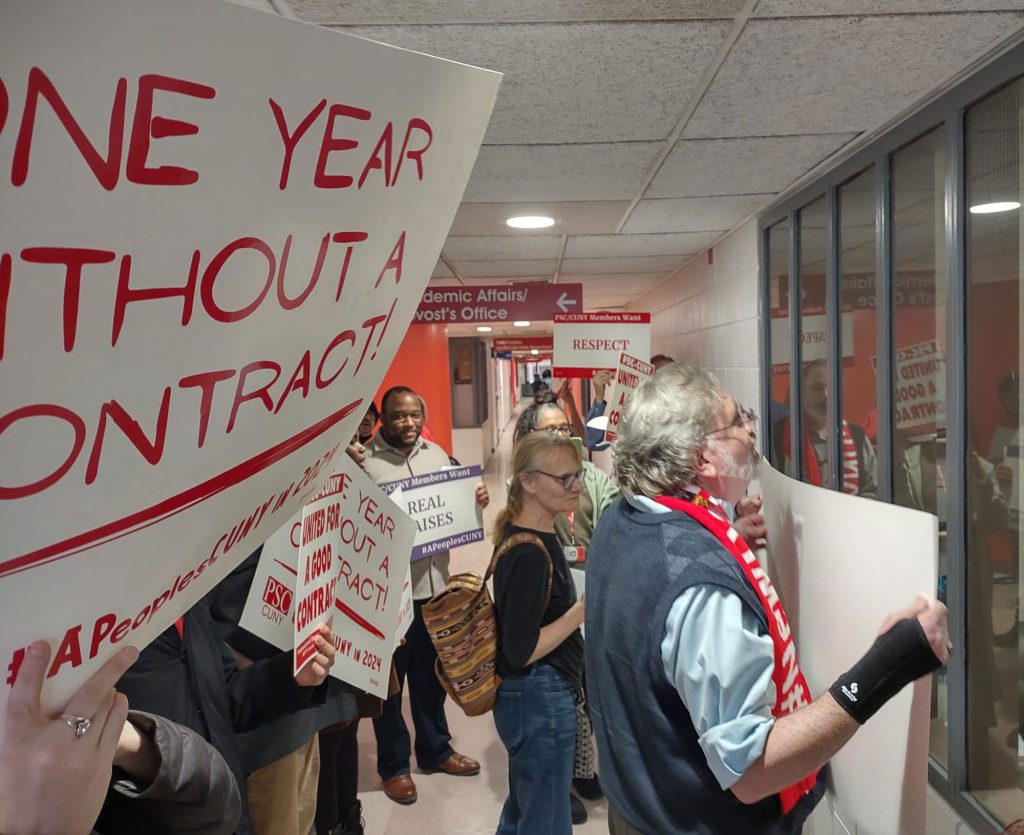
York College members descend on their president’s office. Photo credit: Nathan Nikolic
“Members at my campus are frustrated and irritated,” said Ruth Wangerin, an adjunct assistant professor of anthropology at Lehman College. “We were expecting raises to keep up with inflation. People in some titles have been waiting too long for well-deserved improvements in working conditions and promotion opportunities. For the more than half the faculty who serve in contingent positions for relatively low pay, the lack of a settled contract makes the future seem even more uncertain. As class sizes increase and the number of courses decreases, we hear of people who have given years to CUNY being discarded, [and they’re] out looking for another profession.”
She added, “With the contract in limbo, people who will be eligible for appointment or reappointment to a multi-year appointment are also in limbo, along with their department chairs. Do we believe management, who say there will be no more multi-year appointments, or do we believe that with union solidarity, we will win the renewal and expansion of the pilot? One might think there’d be a growing sense of despair the longer we go without a contract, but what I’m actually seeing is a growing sense of determination to do what it takes to win a good settlement.”
BUILDING SUPPORT
Her colleague, Stuart Chen-Hayes, a professor in counselor education, described the Lehman chapter’s day of action: “We marched all through the administration building and got extra loud outside the president’s office. We gave fliers to over 100 students, and we built solidarity by talking about how our working conditions are their learning conditions. We talked about how our demands are not just for us but for them: free college and more mental health counselors and advisors. Every single student and staff member we fliered was in total agreement.”
For many at CUNY, the lack of a contract settlement feels insulting after all the work faculty and staff did during the pandemic. “Coming out of the three tough years of COVID, where higher education officers had to leverage their professionalism and skills to keep the University going with very little support, encouragement or clear direction from above, [and then] going a year not just without a contract but with insulting demands at the negotiating table is demoralizing to say the least,” said John Gallagher, a HEO at Borough of Manhattan Community College. “The University survived COVID because of efforts from the bottom up, with contingent faculty and rank-and-file HEOs showing exceptional professionalism, dedication and creativity to keep the promise of CUNY alive.”
Lucy McIntyre, the PSC chapter chair for the CUNY Central Office, said, “A delay in a fair and equitable contract reduces employee morale and devalues their contributions to the University. Over the last four years the landscape of CUNY and the labor force has changed. In order for all of us to move forward, we need to give our employees what they need to be productive: an increase in salaries, contractual remote work options, job security and job advancement opportunities. The PSC bargaining team will continue to work relentlessly until we have a fair and equitable contract.”
BARGAINING SUPPORT
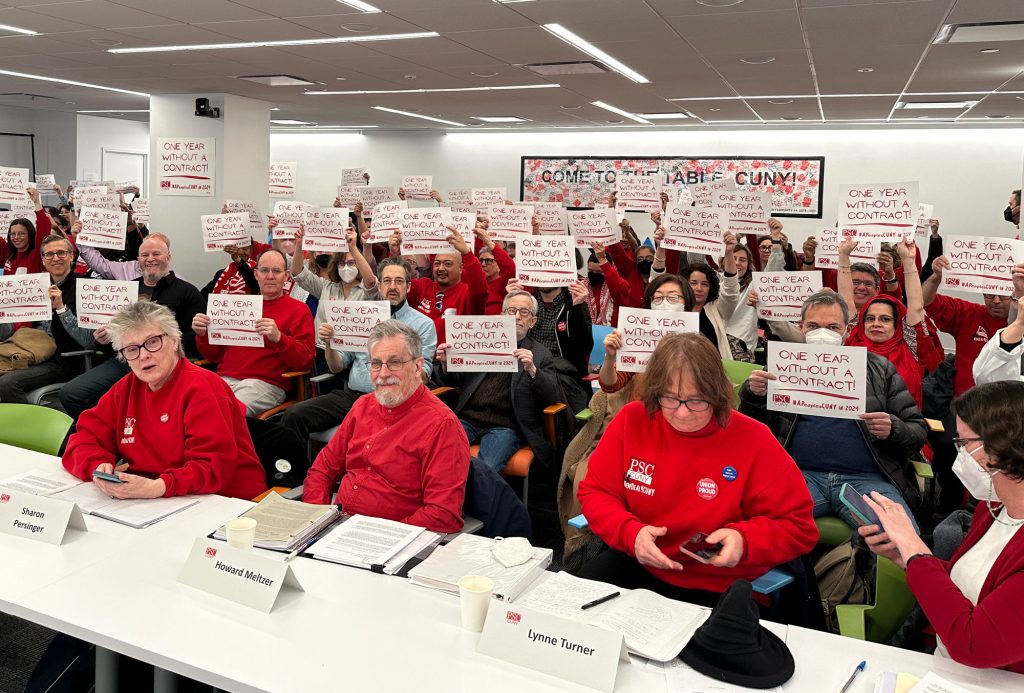
Members show solidarity during a bargaining session with CUNY administration. Photo credit: Rico Doan
On the same day as the citywide protests, more than 100 members packed the PSC union hall to observe a bargaining session with the CUNY administration, sending a strong message to the University that the membership is united in the contract campaign. On March 6, the union also held a virtual mass meeting with hundreds of members to discuss the status of contract negotiations and the campaign going forward.
CUNY’s apparent unwillingness to offer substantial wage increases to PSC members has been met with skepticism. Management’s cries of poverty aren’t taken seriously. “There is not a real financial crisis,” Bockmeyer said.
And if there is a budget crunch at CUNY, the administration should be advocating for more state and city funding for public higher education, she said.
“We need CUNY to fight for us at the State and at City Hall,” she said.
mass meeting
At a mass meeting on Zoom, PSC President James Davis informed members about the status of negotiations. He summarized the union’s bargaining position as one that seeks professional respect, higher wages and a more equitable workplace, while management’s bargaining agenda has been defined by “cost savings, cost savings, cost savings,” as well as a “disregard for the well-being of our members.”
For example, PSC Secretary Penny Lewis noted that management is seeking to “nickel-and-dime” the membership with a host of concessions. “CUNY on the cheap is CUNY in crisis,” she said.
management silence
Andrea Vásquez, the union’s first vice president, said CUNY wanted to “eviscerate job security” for higher education officers. PSC Treasurer Felicia Wharton said, “CUNY has been silent on many of the demands we have put across the table.”
Melinda Person, president of the PSC’s state-level affiliate, the New York State United Teachers, joined the mass meeting to tell members, “Your statewide union has your back.”
member responses
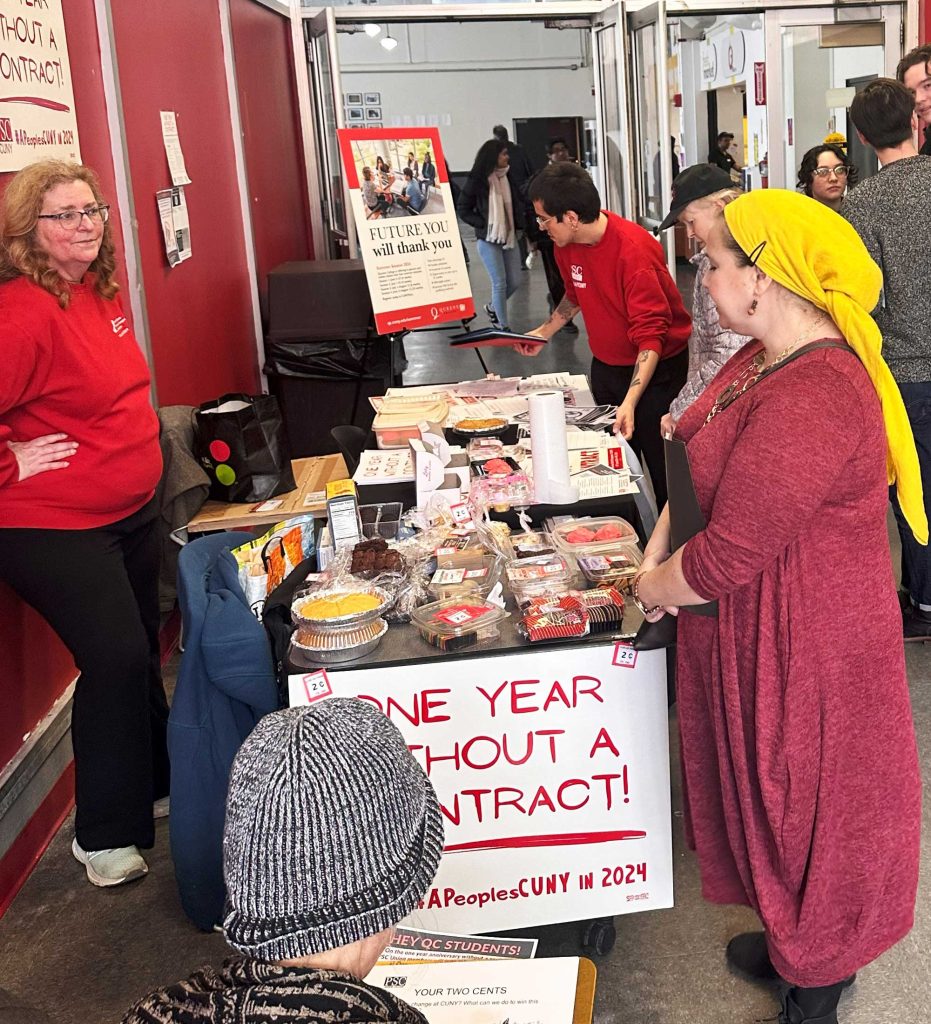
Members hold a bake sale at Queens College and ask for ‘two cents.’ Photo credit: Erin Lilli
Karen Weingarten, the Queens College PSC chapter chair, said that her chapter held a bake sale along with their February 29 picket, but that instead of asking for money, the PSC solicited faculty, staff and students for their “two cents” about working without a contract. “We got some really, really excellent responses,” she said. “We’re working to get more people involved.”
With no economic offer from management, the union will need to escalate the contract campaign this semester, the union’s leaders told members. As this newspaper went to press, the union was already planning for several actions to take place in April, including one at a CUNY Board of Trustees public meeting.
“We’re really at a crossroads,” Davis said, encouraging members to join their Campus Action Teams. “The remaining months of this semester are critical.”
Published: March 27, 2024

